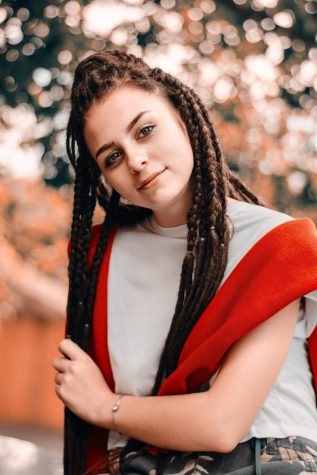Bhad Bhabie and Cultural Appropriation
April 30, 2020
In today’s media-saturated world, nothing goes unseen. And now that we are all stuck inside because of the Coronavirus, that is even more true. This isn’t a good thing for 17-year-old rapper and internet personality Bhad Bhabie, whose recent appearances in the media have drawn backlash over cultural appropriation.
You might know Danielle Bregoli, also known as Bhad Bhabie, from her 2016 appearance on Dr. Phil. She became known as the “catch-me-outside girl” after she reacted to heckling in the crowd with, “Catch me outside, how about that?”, or “Cash me outside, howbowdah?” as it came out in her Floridian accent.
Bregoli never caught a glimpse of any good that can come from the spotlight, not since that debut. Many people have despised her since early on. Even the music manager who signed her in 2017 received criticism.
Most recently, she has upset individuals from the Black community with her recent attempts to make herself appear darker on social media posts, and for wearing box braids. Bregoli is the child of a Jewish father and a mother of Italian descent. The cultural appropriation accusations started to boil over after a video was posted by Bhad Bhabie where she had applied foundation to darken her skin.
Asyera Clarke reminds us that this is a case of modern-day blackface. “People can just say it’s makeup,” Clarke said, “but no, if you want to appear darker, get a spray tan. There is no reason I should be seeing white people picking and choosing [when] they want to appear darker when we wear our skin every day through all oppression with pride.”
After facing a huge wave of negative responses, Bad Bhabie went live to tackle and clear up all of the racism accusations. Unfortunately, her response was tone-deaf. She started addressing the comments that she wanted to be black. Bad Bhabie then started to compare growing up in the hood to the jungle.
“Maybe the reason for [appearing black] is because I grew up in the hood,” she said. “Tarzan…he grew up around the bears in the jungle. He didn’t know any better! … That’s all he knows! When someone grows up in a certain area or a certain place, they’re a part of their environment.”
Understandably, the Black community grew angry with the fact that she compared growing up in the hood to living with wild animals.
Keesha Bernadin reminds us that Bhad Bhabie preaches that she doesn’t want to be Black, but her actions don’t match her words. Jael Goldfine from Paper Mag notes that Bregoli has parodied Black women since her initial appearance on Dr. Phil, which was full of African-American Vernacular English.
It is disappointing to Bernadin to go on social media every day and see hairstyles she grew up wearing essentially being gentrified in the media. Women of color wear these styles to protect their hair, while Bad Bhabie and others wear it as a fashion choice.
“It is really hard to understand how many Black women grow up trying to normalize a hairstyle from when they were younger,” Bernadin said. “There are many cases where individuals made fun of my classmates for wearing ‘horse hair.'”
A Tik Tok rant video surfaced of student Madison Payne explaining the topic of cultural appropriation after Bhad Bhabie blew up in the media. She explains the problem many of us know all too well.
“First things first,” Payne says, “They are protective hairstyles to protect a person of color’s hair. And for people of color, especially black people, those hairstyles are so deeply ingrained into the history and culture of who they are.”
Young white teens make Tik Tok videos playing Black people on the screen with hair extensions. Those same teens can’t respond to Black people “wanting it back” by claiming that Black women who straighten their hair are doing the same thing. Payne reminds us, “You can not appropriate white culture.”
Her goal with the video explaining cultural appropriation is not to tear down anyone, but to bring emotional clarity to others who did not grow up Black, and to explain how it may feel to see a white person acting this way. The goal is to be less ignorant and more educated on the topic of blackfishing and cultural appropriation.

Photo by Irina Iriser on Unsplash


